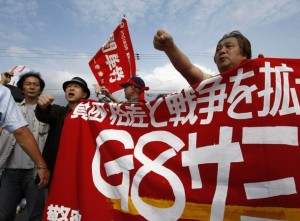Japan Times | Wednesday, July 8, 2009
LONDON (Kyodo) -- Prime Minister Taro Aso says he will call on world to develop principles promoting responsible foreign investment in agriculture in the face of "land grabs" of large-scale farmland in poor nations to ensure food supplies for wealthy nations.
In an article contributed to the Financial Times, Aso said food security will be the highlight of the discussion Friday among the leaders of the Group of Eight and urged concerned parties to "frame a coordinated global response" to such land deals.
The Washington-based International Food Policy Research Institute has called for an internationally accepted code of conduct with regard to land transactions, warning the practice raises "concerns about the impacts on poor local people, who risk losing access to and control over land on which they depend."
The institute has said land grabs could harm environmental sustainability if foreign investors focus on short-term profits or lack an understanding of the local environment.
Aso pointed out that following the skyrocketing global food prices that triggered social unrest and export restrictions last year, food-importing countries rushed to grab land.
Noting the current food crisis reflects "new economic, climatic, demographic and ecological reality," food security "can no longer be just a matter of famine relief," he said. "The question must be how we can expand food production beyond traditional economic and geographical boundaries in order to live sustainably."
Aso recommended the adoption of nonbinding principles, including transparent and accountable investments, respect for the rights of local people as well as consideration for recipient countries' development and environmental policies.
Aso pledged to work with key partners to develop a global platform to agree on principles and good practices. He called on parties to meet in September.
The research institute says food-importing countries that have land and water constraints but are rich in capital, including Middle East oil-producing nations, as well as states with large populations that face food security concerns, particularly China, South Korea and India, have invested in vast farmland in poor countries, mainly in Africa.
In Madagascar, negotiations with Daewoo Logistics Corp. of South Korea to lease 1.3 million hectares for maize and oil palm free of charge for 99 years reportedly played a role in the political conflicts that led to the overthrow of the government earlier this year, according to the institute.
As an example of large land acquisitions by foreign companies, the institute pointed out that major trading house Mitsui & Co. sealed a deal in 2007 to invest in a Swiss firm that owns 100,000 hectares of Brazilian farmland for soybean, corn and cotton production.











